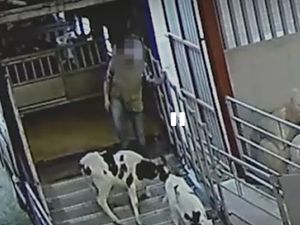Jeremy Corbyn joins Shrewsbury 24 celebration
It took nearly 50 years to clear their names but this weekend members of the Shrewsbury 24 returned to the town to celebrate – joined by former Labour leader Jeremy Corbyn.
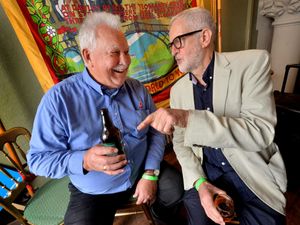
In March this year 14 of the Shrewsbury 24 had their 1973/74 convictions quashed by the Court of Appeal.
The move came after years of campaigning, with lead researcher Eileen Turnbull uncovering crucial evidence to overturn the convictions.
Saturday saw members of the 24 joined by supporters and campaigners for a celebration at St Nicholas Bar in Shrewsbury.
Terry Renshaw, a former Flintshire mayor, was one of those present for the occasion who had been cleared earlier this year.
He took part in a march from Shrewsbury Railway Station to the venue before the celebrations began.
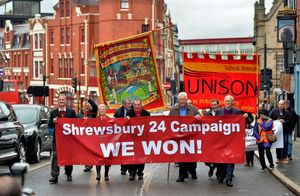
Bearing banners stating 'Shrewsbury 24 Campaign – We won', and 'Shropshire and Telford Trade Union Council', they were beeped by angry motorists who seemed to confuse the group for climate change protesters.
Asked how he felt to be back in the town with his name cleared Mr Renshaw said: "Fantastic. We won."
The 73-year-old, who was 25 when he was convicted, said the judgement had limited his opportunities and cast a long-time shadow on his life.
He said: "It stopped me doing quite a lot of things I wanted to, both politically and in my normal life – I couldn't get a visa to to to America.
"When I first stood for elections in 1981 on the doorstep everyone was saying 'you are one of those Shrewsbury pickets aren't you?', and I said 'yes, I am proud of it and I have never denied it'."
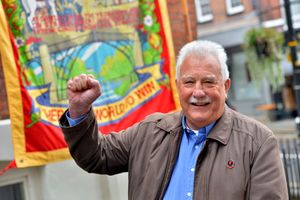
Mr Renshaw said that Shrewsbury and the surrounding area had shown significant support for the efforts to clear their names.
He said: "This place has been so supportive. We had a play going round the country and when it was in the theatre here every one of the three nights was full. Everyone wanted to ask questions about what was happening and where the case was going,
"There has been fantastic support from normal people, but also the Shropshire and Telford Trade Union Congress. They organised a few rallies where we marched from the car park all the way up Abbey Foregate which just helped keep the profile going."
Mr Corbyn, who grew up in Newport, said he was delighted to be joining the celebration, and added that the case was an example to always stand up for what you believe in.
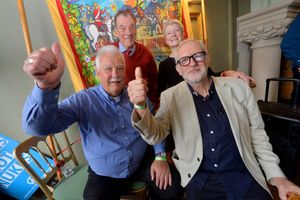
The former Labour leader was mobbed by supporters at the venue, with queues of people waiting for the opportunity to talk with the MP for Islington North, grab a selfie, or get an autograph.
He said: "In the 1972 building workers strike terrible things were said about building workers. They were criminalised, imprisoned in some cases and in all cases unable to work in their chosen profession after.
"Today we celebrate the perseverance of all of them, and the efforts of Eileen, she is a truly phenomenal woman.
"It shows that no matter how bad the situation is, solidarity and support for each other during very difficult times can make the difference."
He added: "Imagine in some cases you take industrial action – which you are legally entitled to do – and you end up being put in prison, criminalised, not able to work and your life is spent in poverty because of it. The determination of them to stand together and finally win together shows how good they are.
"It is an object lesson to every young person to stand up for what you believe in."
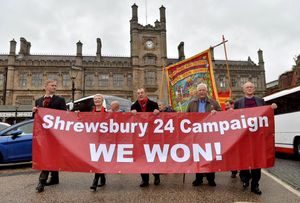
Ms Turnbull said they were thrilled to be able to celebrate together, adding: "To overturn a monumental miscarriage of justice after 47 years, it feels wonderful. The pickets were completely vindicated when they had said all those years ago they were innocent."
Ash Silverstone, president of Shropshire & Telford Trade Union Council, said it was a long overdue celebration.
He said: "It is absolutely amazing. It has been nearly 50 years and you just think 'how the hell?'. What it proves is if you are on the right side of history eventually it will all come through."
The 14 had been part of workers who had picketed during the 1972 national builders’ strike and were charged with offences including unlawful assembly, conspiracy to intimidate and affray for picketing.
The pickets were striking for better wages and health and safety, at a time when many workers were injured or killed on building sites.
Twenty-two of them were convicted across three trials in 1973 and 1974 and six were jailed, while two were acquitted.
Six of the 14 cleared in March, including Des Warren, who was jailed for three years, had since died and their appeals were continued in their name by their relatives.
The Court of Appeal overturned the convictions of all 14 on the grounds that original witness statements had been destroyed.

